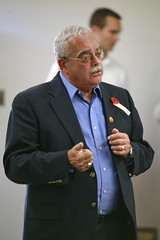Transparency Hearing Highlights Spending Data Issues
by Sam Rosen-Amy, 3/16/2011
 Even though Sunshine Week is officially this week, the House of Representatives got the ball rolling last Friday. The House Oversight and Government Reform Subcommittee on Technology, Information Policy, Intergovernmental Relations and Procurement Reform (say that ten times fast) held a hearing called "Transparency Through Technology: Evaluating Federal Open-Government Initiatives," although the hearing focused more on spending transparency than anything else. While one would expect that an oversight hearing in the House “evaluating” the Obama administration’s transparency efforts would be contentious, the most surprising aspect of the hearing was that it wasn’t.
Even though Sunshine Week is officially this week, the House of Representatives got the ball rolling last Friday. The House Oversight and Government Reform Subcommittee on Technology, Information Policy, Intergovernmental Relations and Procurement Reform (say that ten times fast) held a hearing called "Transparency Through Technology: Evaluating Federal Open-Government Initiatives," although the hearing focused more on spending transparency than anything else. While one would expect that an oversight hearing in the House “evaluating” the Obama administration’s transparency efforts would be contentious, the most surprising aspect of the hearing was that it wasn’t.
The subcommittee’s chairman, Rep. James Lankford (R-OK), started the hearing off with a balanced tone. In his opening statement, Lankford commended the Office of Management and Budget (OMB), specifically on its efforts with USAspending.gov, Recovery.gov, and Data.gov. “It is not our intent today to belittle the efforts of this administration,” Lankford said, “only to discover the important lessons learned and to hear the steps being taken to move things forward.” It was good to see that the subcommittee was more focused on solving problems than scoring political points, a concern some have with a Republican House Oversight Committee.
The good feelings, however, didn’t last the entire hearing. Full committee chairman Rep. Darrell Issa (R-CA) was more critical of the administration than Lankford, calling the spending data "useless." Several members of the subcommittee were miffed that Daniel Werfel, the head of OMB’s Office of Federal Financial Management, asked to be on a panel by himself, citing an apparent long-standing precedent. The subcommittee’s vice-chair, Rep. Mike Kelly (R-PA), was particularly incensed, saying it betrayed the administration’s transparency rhetoric.
Eventually, the subcommittee got around to debating actual policies. With Sunlight Foundation executive director Ellen Miller as one of the witnesses, the conversation quickly focused on spending transparency and data quality. Subcommittee members used research from Sunlight to press two of the other witnesses, chief information officers (CIOs) from the departments of Agriculture and Education, on USAspending.gov data quality. Kaitlin Lee over at Sunlight has a pretty good rundown of two of the more contentious issues debated during the hearing, school lunch block grants and student loans. Sadly, the hearing provided little in the way of new details from the administration, with the CIOs simply saying that the administration is making unprecedented strides in spending transparency, and that their data isn’t as bad as Sunlight suggested.
In a more positive note, towards the end of the hearing, the subcommittee’s ranking member, Rep. Gerry Connolly (D-VA), brought up tax expenditure transparency. Saying “I don’t think we pay enough attention up here to tax expenditures,” Connolly correctly pointed out that they are a “real life spending item by any other name” and should be tracked. He asked Werfel what OMB was doing to make sure the federal government “shed enough light on tax expenditures and their relationship to the deficit.” Werfel dodged the question, saying he first needed to talk with Internal Revenue Service, but in a show of bipartisan support, Lankford chimed in, saying it’s important to have transparency in this area. With tax expenditures consuming a trillion dollars a year, we couldn’t agree more, and look forward to Congress and the administration working together on tax expenditure transparency.
Image by Flickr user cliff1066TM used under a Creative Commons license.



